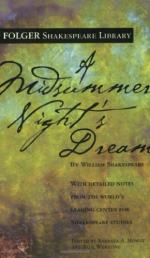|
This section contains 8,226 words (approx. 28 pages at 300 words per page) |

|
SOURCE: Wiles, David. “The Carnivalesque in A Midsummer Night's Dream.” In Shakespeare and Carnival after Bakhtin, edited by Ronald Knowles, pp. 61-82. New York: St. Martin's Press, Inc., 1998.
In the following essay, Wiles examines the festive and carnivalesque elements in A Midsummer Night's Dream. According to the critic, the play was historically part of an “aristocratic carnival” used to celebrate weddings in upper-class society.
Carnival theory did not begin with Bakhtin, and we shall understand Bakhtin's position more clearly if we set it against classical theories of carnival.1 From the Greek world the most important theoretical statement is to be found in Plato:
The gods took pity on the human race, born to suffer as it was, and gave it relief in the form of religious festivals to serve as periods of rest from its labours. They gave us as fellow revellers the Muses, with Apollo their leader...
|
This section contains 8,226 words (approx. 28 pages at 300 words per page) |

|


